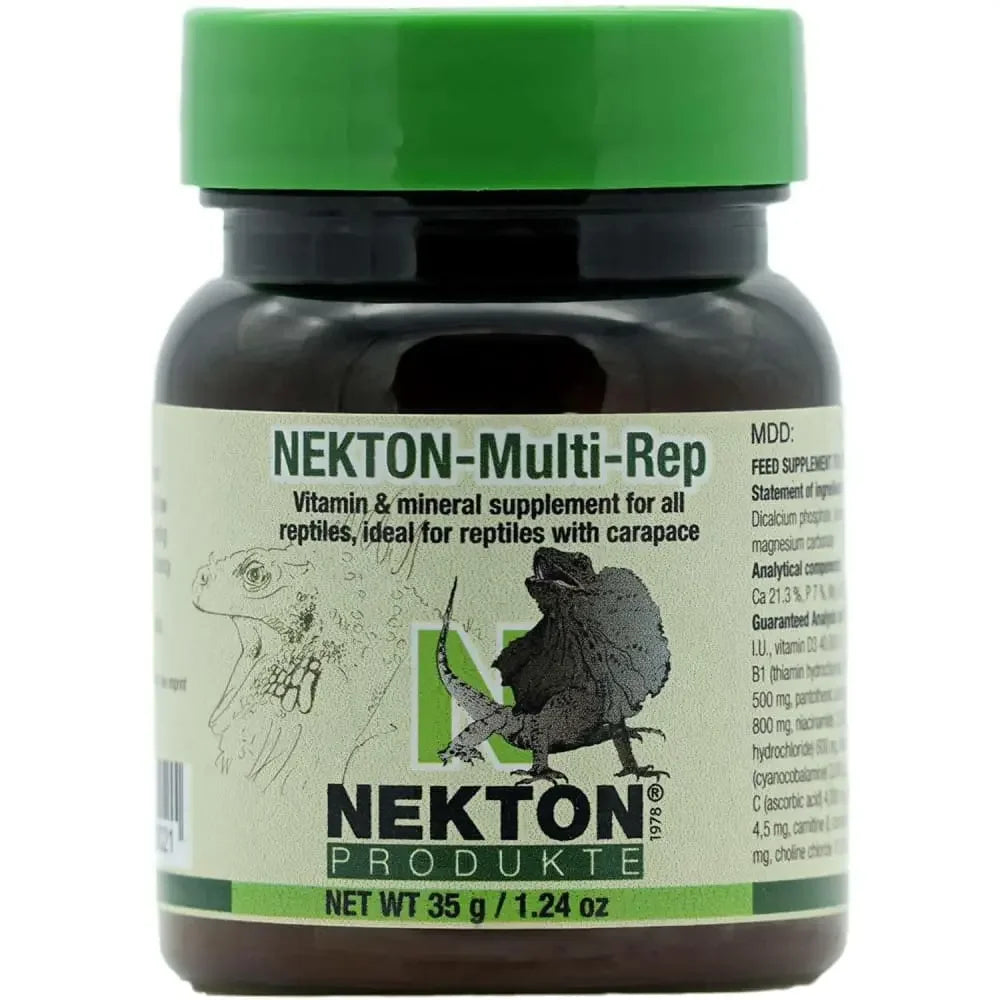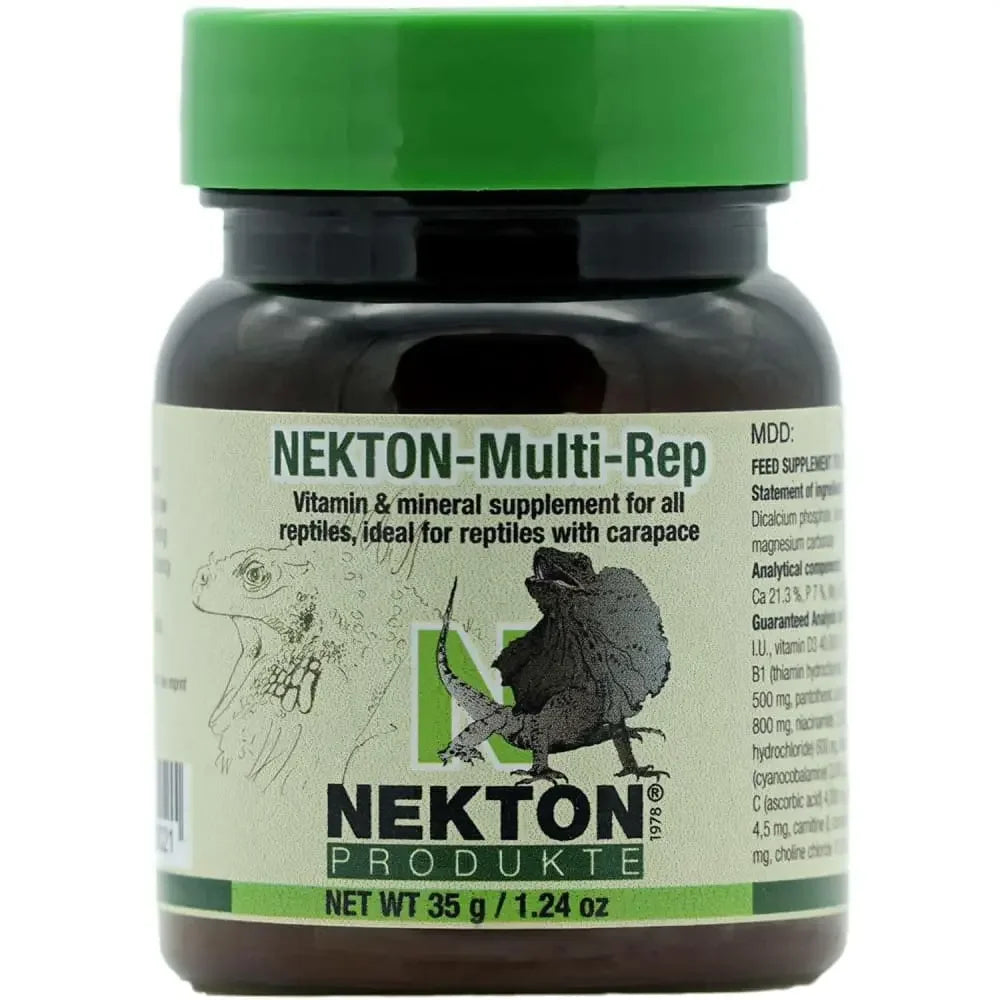Nekton Multi-Rep Vitamin and Minerals for All Reptiles
- Sku: TNEK22703S
- Vendor: Nekton
NEKTON-Multi-Rep contains 12 vitamins, 9 amino acids and 7 trace elements. NEKTON-Multi-Rep has been developed in accordance with the latest scientific findings and ensures the animal's basic health care. NEKTON-Multi-Rep encourages stable construction and maintenance of the skeletal system, as well as the animal's healthy growth. Signs of paralysis, such as e.g. legs tightening, are prevented by regularly administering NEKTON-Multi-Rep. Thanks for a low vitamin A concentration, this compound is particularly suited for armor-shelled reptiles and amphibians. A well-balanced ratio of calcium and phosphorous ensures a solid bone structure. To prevent and balance nutritional deficiencies and its secondary diseases, NEKTON-Multi-Rep should be supplied at least 1 x per week. No other vitamin compound should be administered whilst using NEKTON-Multi-Rep.
Amphibians and reptiles are vertebrate like their aquatic ancestors. Only a small amount from the abundance of orders, families, genera and species from prehistoric times have remained, however a total of around 9,000 species still offer a variety of shapes, colors and characteristics. Today's reptiles and amphibians can be found on all continents and reside in a wide-variety of habitats. Amphibians have not yet been able to fully break away from their ancestors' habitat. As their skin does not have sufficient protection against evaporation, they still mainly have to live in water or near it in damp areas so they do not dehydrate. Even though a few reptiles are water dwellers, their offspring evolve without this interim stage and hatch from eggs as miniature versions of their parents. In most cases, reptile embryos develop fully within the egg and hatch during or shortly after delivery. Because the freshly hatched/new born young animals breath air and also have a solid protective skin, unsuitable for letting the skin breathe, eggs and young animals must be deposited on land. The requirements that must be fulfilled to keep and preserve amphibians and reptiles are diverse. You must first learn as much as possible about the animal's natural habitat to adequately adapt the terrarium. If it is not always possible to fully recreate the natural habitat, you can also keep the animal in the best possible health and ready to reproduce.
The most basic conditions for this are: Light, temperature, air, space and nutrition. The requirements of our terrarium animals' types of food are very different. Amphibians are mostly carnivores. Reptiles are carnivores, herbivores or omnivores, depending on the species. Whatever it likes, the most crucial part of nutrition is its ingredients: Carbohydrates (starch, sugar, raw fiber), fats, proteins, minerals (major and trace elements), vitamins, water. Carbohydrates supply energy. A total lack of carbohydrates can damage the composition of the intestinal flora and can result in disruption of vitamin synthesis. As concentrated calorie carriers, fats also supply the necessary energy for the animal's body. An important function of fat in the metabolism is its ability to reabsorb liposoluble vitamins and pro-vitamins. From the fatty acids, unsaturated fatty acids are particularly important because they ensure the undisturbed development of the skin and scales as well as regulating the entire body's water supply. Protein substances of each food consists of different amino acids that cannot be replaced by other substances. The individual amino acids derived from food are suitable for different animals in a variety of ways to build up the body's natural proteins.
From the minerals, the following major elements are important: Sodium, potassium, phosphorous, calcium and magnesium. Also important are the trace elements copper, zinc, manganese, cobalt, molybdenum, iodine and iron. They are crucially important for regulating the water supply and for protein metabolism. Chlorides and phosphates must be present in salts. Calcium and phosphates, in balanced proportions, are exceptionally important for bone construction and maintaining stability. The body requires vitamins to support the flow of essential processes. Vitamins resemble catalysts, i.e. they intervene with controlling the metabolism, without actually supplying energy themselves or serve as building material for constructing body cells. A healthy body can only produce a few of them itself and not always in sufficient quantities. If a sufficient quantity is not available, deficiency symptoms begin. A number of defects due to a lack of vitamins are known in amphibians and reptiles. For example, to little vitamin A can lead to eye inflammation or eye damage. Bone damage in amphibians and bone softening in reptiles is caused by a lack of vitamin D. A shortage of the B-complex vitamin is significantly involved in digestive disorders, paralysis and skin damage. To prevent such deficiency symptoms and to be able to offer the animal optimum nutrition at all times, NEKTON has developed a range of products that enable specific care with the various nutrients and active substances. A green measuring spoon is attached to each bottle of NEKTON-Multi-Rep. 1g of NEKTON-Multi-Rep corresponds to one measuring spoon.

Nekton Multi-Rep Vitamin and Minerals for All Reptiles







